Award Books by Genre: Nebula Award
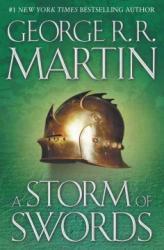
If things hadn’t already turned dark in Westeros, they certainly do in A Storm of Swords. The complicated political situation in the end of A Clash of Kings gets even more complicated as this third book dives into complex armies, weddings, wars, and so much more. George R. R. Martin’s writing may be dense, but I have never encountered a fantastical world as deeply developed as his. A Storm of Swords is jam-packed with intrigue and excitement, and it left me wanting more. I would recommend this book even if you have already seen the show; reading the books adds a whole new dimension to the characters, the plot, and the world.
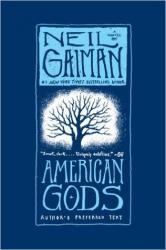
This book follows ex-convict Shadow, once he is released from prison and enters into a new job as the assistant to Mr. Wednesday (more commonly known as Odin). Shadow doesn’t believe the fact that he is surrounded by gods, until Mr. Wednesday introduces him to god and god and shows him undeniable evidence. Mr. Wednesday is using Shadow as a mean of amassing the older, more forgotten gods into an army ready to retaliate against the new gods of the modern era. Technology, for example, is depicted as a god, but a socially removed and young god. This has been one of my absolute favorite books to read because of how it explores the change in worshiping from ancient gods and folklore into technology, media, and trends. The book is so complicated because it brings together ancient gods of cultures from around the world.
Each have different origins and purposes, and the role Shadow plays as the representation of humanity only intensifies the surreal feeling of the book.
I liked how I was able to relate to Shadow, as bring subject to the controlling factors of society, whether they be demanding gods or media outlets. I appreciated how well-researched the cultures written about were, and how there isn't a page in the book that doesn’t bring about another point to think about, something like morality or control. The book is also very entertaining and a fascinating storyline, and I would highly recommend it to any reader. I would give it five out of five stars.
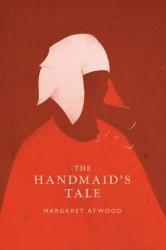
This book is old school dystopian literature. Atwood nails it. It's likely the best dystopian novel I have ever read.
Offred is a handmaid, a woman set aside for breeding purposes. Her only desire is to survive, but her memories push their way up into her mind. She had a husband and a child and they are gone. What broke my heart were the memories of her beloved child. It's so softly touched upon that it shows itself as a raw wound that she can barely handle.
Well told and powerful, I give this book 5 stars.
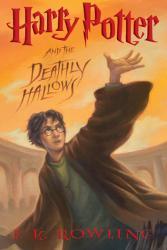
Harry Potter and the Deathly Hallows finishes off an exciting series that is one of the best of all time. In this book Harry finds out that he must kill Lord Voldemort and can only do so by finding his hidden Horcruxes. The book contains an astonishing ending and many characters fight for their lives. It also has twists, turns and plenty of action as Harry, Ron and Hermione run from Death Eaters on the quest to kill Voldemort. I would recommend this book for older readers and adults. Also, I would recommend reading the books before this one to understand what is going on in the story. It is an overall action-packed adventure.
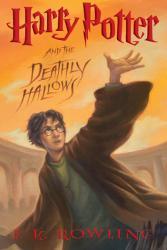
Harry Potter and The Deathly Hallows was a great book that I loved! In this book Harry, Ron, and Hermione all set of on a mission that Professor Dumbledore left Harry at the end of his 6th year at Hogwarts; to find and destroy the Horcrux's that Lord Voldermort has made to make himself immortal, or as close as he can get to it. As harry and his friends set out they discover that this will not be as easy as they had thought. As they find out how the Ministry of Magic has been infiltrated by he-who-must-not-be-named their mission just becomes more important. Can Harry and his friends do it and restore the magical community to the way it used to be?
7th grade
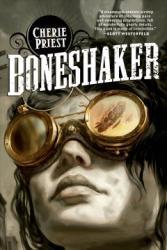
I suppose when I chose to read this book, it would have been a little more steampunk than it was. Sure, Boneshaker has some of the trappings of a steampunk story, like the Civil War and inventions comprised of brass; but in the end, it felt more like light window dressing than something important to the plot. Surprisingly enough, this book was more along the lines of a zombie apocalypse novel than a steampunk one. In that sense, I’m disappointed that the cover didn’t completely deliver on its premise and instead decided to rely on the tropes of the post-apocalyptic genre.
The characters themselves were somewhat interesting, but their motivations seemed a little flat. The boy who wants to find his father and the mother who chases after him aren’t that compelling. In fact, the journey of both characters could have probably been accomplished via one of them, with supporting characters providing information about the other one. If anything, the plot was only used as a method to explore this semi-steampunk Seattle. This meant that, by the end of the book, there were quite a few more questions I had than answers. I guess that’s why there are two more books in this series.
I think my main problem with this book is that it isn’t more thoroughly tied to real history and real locations. Sure, there were a few mentions of the Civil War, but if you removed those few links to history, the story stands on its own pretty well. In fact, you could probably set this anywhere, even in its own, unique world, and it should still work. Because it doesn’t rely on our knowledge of history and familiar places, it doesn’t feel like the “alternate history” that steampunk can provide. In the end, this was a pretty good idea, but it’s misleading in its marketing.
A post-apocalyptic zombie book that has hints of steampunk thrown in, I give Boneshaker 3.0 stars out of 5.
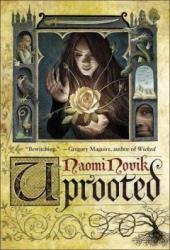
Uprooted by Naomi Novik was an interesting read - with magic and mythical creatures - but I found that in the first few chapters I stepped away from the novel several times. The beginning was slow with not much action, more setting up the scenery and the laws of the land than anything else. The novel follows a girl named Agnieszka living in a quaint village called Dvernik by a magic infested forest where every ten years a mysterious and immortal wizard called the Dragon, who lives in a nearby tower, visits to pick one woman as payment for protecting Dvernik from The Wood. Agnieszka is chosen to her surprise, but her interactions with the infamous Dragon are almost boring - they share a typical, overused trope in a love-hate relationship that frustrates the reader. The two are also locked away in the tower where there are minimal outside interactions from any other characters for almost the entire first half with the exception of one of Agnieszka‘s bedridden friends. I found that the last half of the novel was the most interesting because that was when other characters from the faraway capital were introduced and the scenes were more fast-paced. Because the world building aspect in the beginning was making me impatient, the problem was that later when Agnieszka returns to her village, I spent a long time away from there that the characters and their relationships were hard to remember and I personally did not care for them. There were definitely characters I met in the last half that I empathized or was absolutely lucid with and I did enjoy all the plot twists because, of course, they were unexpected and added some excitement to Uprooted. Overall, the beginning takes off one star for me due to the inaction and some common young adult tropes were utilized, but I loved most of the characters and the plotline anyway regardless of the latter.
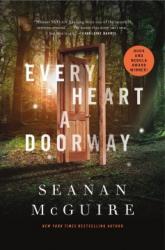
A fascinating and dark book. The premise is enjoyable. I adored the thought of a home for kids who went to other worlds. The kids could be summed up in one word: PTSD. And they were perfect, with complex backstories and hopes and dreams. The world's were even better, from the silent Hall of the Dead to the Moors, a world hovering between the lightning strike and the resurrection. I couldn't put the book down. In fact, I wish it was longer so I could spend more time in the rich world with its people. From a dapper mad scientist to a girl who ran on rainbows, they are all unique. And I love them for it. I love their interactions and their longing for the world's they had seen. The question was, who would murder to go back to the place they considered home.
Reviewer Grade: 10
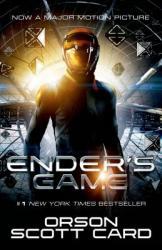
Ender's Game is an enthralling and thrilling sci-fi following a young boy as he is prepped to save the world. Ender departs for battle school at the ripe age of 6, where he is thrust into a world were children go head to head in a competition to be the best, fight in an all out war, and earn all the glory.
Although young and inexperienced, Ender is the best. But things seem to be stacked against him....
Orson Scott Card writes with incredible dexterity and Ender's Game pulls you into a new world.
(Reviewer Grade: 12)
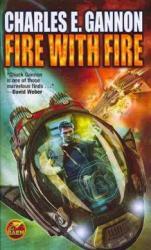
I’m not sure which is more boring in a book: a plot that doesn’t go anywhere, or a main character who is perfect. Unfortunately, Fire with Fire has both. I’ll first start with my qualms about the plot. This story started way too late, as it didn’t get interesting until halfway through.
Even when it did finally get interesting, it suddenly became bogged down in committee. Seriously? Didn’t we learn anything from the Star Wars prequels?
Adding politics to a story about traveling across space merely makes it tedious. This is also not to mention how heavy and clunky the exposition is, with almost every chapter being filled with information that isn’t important, and the jumps between chapters needing way more explanation.
Secondly, let’s take a look at “Mr. Perfect,” Caine Riordan. Aside from the egregious fact that the POV switched between 1st person and 3rd person within most of the paragraphs of his section (with no italics or indication that we were suddenly in Caine’s head), I felt this character was just the author’s way to show how smart he is. With the expansive repertoire of high-value vocabulary words and a character that always knows what to do all the time and has all the correct answers, I ended up not caring about any of it by the end. And I haven’t even mentioned the blatant and pervasive misogyny either.
Even the rest of the supporting cast was so flat and one-dimensional that I probably couldn’t tell you who they were or what their defining characteristics were (aside from that one mysterious guy who LOVED olives and feta cheese). Most of the time I was reading this book, I kept wondering, “Wait . . . what?” as what seemed to be major plot points were introduced then almost immediately forgotten until hundreds of pages later. I’m not sure how this book managed to get a series tacked on to it, or how it was even nominated for a Nebula Award, but it gives me encouragement that I could write something way better than this.
Antiquated sci-fi tropes in a recently written book, I give Fire with Fire 2.0 stars out of 5.
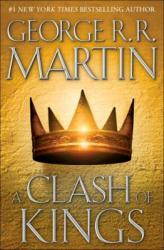
A Clash of Kings is the second book in Martin's A Song of Ice and Fire. After adoring the first book, I was not at all disappointed with the second. The immensely complex fantasy world only continues to grow and develop in this book, as do the characters. George R. R. Martin perfectly juggles all the different storylines, making them all interesting, suspenseful, and fascinating. His characters are so 3-dimensional that characters the reader hates in the first book begin to be shown in a new light. I very strongly recommend this book to anyone that read A Game of Thrones. Every paragraph in this book is so richly embellished and detailed that as I read these books, I felt like I was learning the history of another country.
Reviewer Grade: 11
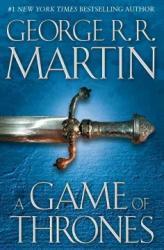
This book blew my mind. A Game of Thrones is the first book in the series A Song of Ice and Fire. These books are fantasy, and they follow the wars, events, kingdoms, and lives of the people of Westeros. This book is extremely dense, but that only means that it is full to the brink of background information and interesting tidbits about the world. The most amazing thing about this book is how developed the world is. Martin must have put an unimaginable amount of time into world-building, and this effort certainly shows. The plot is so complex, and almost all of the characters are wonderfully 3-dimensional.
Reviewer Grade: 11
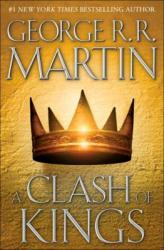
"A Clash of Kings", the second installment in George R.R. Martins "A Song of Ice and Fire" book trilogy, picks up where the first novel, "A Game of Thrones" left off. With the death of the King, Robert Baratheon, and his hand, Eddard "Ned" Stark, war rages throughout the realm, with a total of 5 lords declaring themselves for the throne. Robert's brothers, along with their allied houses, raise their banners in outlaw to the crown, while young King Joffrey defends his claim to the Iron Throne.
Meanwhile, Eddard's eldest son, Rob, rallies the North to secede from the Seven Kingdoms in declaration of their own "King in the North". This, of course, reaps certain consequences in a system built on partitions of trust and loyalty. In the midst of this turmoil, yet another lord, Balon Grejoy, who holds the Iron Islands, joins the fight, and in a distant fog from across the Narrow Sea, lies Daenerys Targaryen. She formulates an Army of Unsullied warriors and manages to acquire 3 dragons, restoring honor to her house and strengthening her claim to the throne.
With time, the war unfolds, and as it does, so do an onslaught of secrets, lies, and betrayals unforseen to even some of the most observant readers.
Martin continues to draw inspiration from English history, while also divulging from reality with the continuation of the white walker plot line.
I moved onto this book from "A Game of Thrones", and can genuinely say that I think it was a major improvement from its predecessor. Although the plot may still move a bit slow for some, now that George R.R. Martin has set the stage with background information, there is much more action than in the previous installment of the series.
One personal complaint of mine is that the sheer magnitude of characters, lore, and history presented in the book can get a bit confusing at time.
Especially for someone who is trying one of their first fantasy novels, this book may not be the best fit. On the contrary, however, if you're looking for a longer, and more austere, read, I would certainly continue onto this book from the last. The plot only gets better with time, and I think you'll be pleasantly surprised. If you decide not to keep reading A Song and Ice and Fire, though, I would recommend trying any one of J.R.R Tolkien's fantasy books. From my opinion, they are similar in style, but different enough to cater to one another's faults.
Grade 10
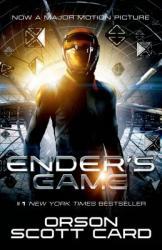
In another “lapse” of my reading habits, I didn’t manage to read
Ender’s Game until the movie of the same name came out in 2013. At the
time, all the sci-fi fans were eagerly anticipating a film that had taken
over 25 years to finally become a reality. While I thought the movie was
quite well done and engaging, after I read the book, I can understand why
some of the diehard fans of the series were disappointed. As is usually the
case with book-to-movie transitions, sub-plots often find themselves on the
cutting room floor. Of course, I don’t blame them for cutting what they
did; after all, it is called Ender’s Game.
Even though watching the movie first spoiled the exciting twist of the ending
when I read the book, I almost read the book differently knowing how it would
turn out. I could see the signs leading up to the shocking reveal, almost as
if I had read it before. I did appreciate the sub-plot with Ender’s
siblings and their efforts back on Earth as their brother was winning the war
in space. If anything, it helped to break up the intense action surrounding
the eponymous main character so that the reader could fully absorb what was
happening in the universe on a political level as well as a military one.
It is disappointing that there will likely be no more movies in this series
since the source material is full of interesting ideas that I’d like to see
on the big screen. Perhaps the series would be better suited for a television
show (a la Game of Thrones) to fully include all the different elements that
made it a classic of sci-fi back in 1985. Either way, I look forward to
exploring more of Orson Scott Card’s universe in the next book of the
series: Speaker for the Dead.
A fantastic sci-fi story with an incredible twist ending, I give Ender’s
Game 5.0 stars out of 5.
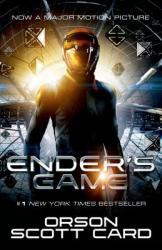
In another “lapse” of my reading habits, I didn’t manage to read Ender’s Game until the movie of the same name came out in 2013. At the time, all the sci-fi fans were eagerly anticipating a film that had taken over 25 years to finally become a reality. While I thought the movie was quite well done and engaging, after I read the book, I can understand why some of the diehard fans of the series were disappointed. As is usually the case with book-to-movie transitions, sub-plots often find themselves on the cutting room floor. Of course, I don’t blame them for cutting what they did; after all, it is called Ender’s Game.
Even though watching the movie first spoiled the exciting twist of the ending when I read the book, I almost read the book differently knowing how it would turn out. I could see the signs leading up to the shocking reveal, almost as if I had read it before. I did appreciate the sub-plot with Ender’s siblings and their efforts back on Earth as their brother was winning the war in space. If anything, it helped to break up the intense action surrounding the eponymous main character so that the reader could fully absorb what was happening in the universe on a political level as well as a military one.
It is disappointing that there will likely be no more movies in this series since the source material is full of interesting ideas that I’d like to see on the big screen. Perhaps the series would be better suited for a television show (a la Game of Thrones) to fully include all the different elements that made it a classic of sci-fi back in 1985. Either way, I look forward to exploring more of Orson Scott Card’s universe in the next book of the series: Speaker for the Dead.
A fantastic sci-fi story with an incredible twist ending, I give Ender’s Game 5.0 stars out of 5.
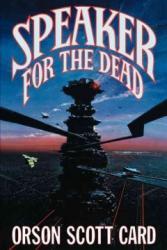
In this sequel to Ender’s Game, Orson Scott Card continues to provide a smartly-written plot that causes the reader to think about death in a whole new way. While the first book in the series gave some thought-provoking insights into war, simulation and the dangers of following orders, Speaker for the Dead examines cultural differences, religion, and the humanity of individuals who acted like monsters during their lives. Instead of moving on from the life of a deplorable person, Card manages to show the reader that a person’s life is made up of all its truths: the bad included with the good.
While Ender Wiggin seemed a little young in Ender’s Game, by Speaker for the Dead he’s aged into a wiser and much more complex character. His experiences in the first book helped to set him up as the universe’s devil and savior, a unique attribute set for a very cerebral character. I did appreciate how the physics of interstellar travel were used as limitations and constraints to make the situation of Ender’s age and experience much more believable. Of course, now that I’ve read the sequel to Ender’s Game, I’m not sure if the sub-plot with his siblings was nearly as important as I thought it would have been, thus making its omission from the movie a sensible choice.
What’s most intriguing about this science fiction adventure is how little science fiction is in it. Sure, there’s light-speed travel, alien creatures, and sentient computers, but when it comes down to it, the story is essentially a detective mystery solved by Ender Wiggin. Perhaps the sci-fi framework helped to create the ideal metaphor for understanding a culture different from our own, but these sci-fi elements could have easily been cut out, and a profound plot would have remained.
Another thought-provoking story in Ender Wiggin’s saga, I give Speaker for the Dead 4.5 stars out of 5.
For more reviews of books and movies like this, please visit
www.benjamin-m-weilert.com
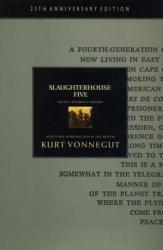
"So it goes..."
You may be thinking that based on the title it is the fifth book in a series of horror novels, but I assure you that it is not. Slaughterhouse-Five is a very thought provoking and poignant anti-war novel that has elements of science fiction, including 4th dimensional time travel and aliens. It’s a nonlinear story that follows a man named Billy Pilgrim as he travels throughout different moments in his life, weaving back and forth through differing time periods. He travels from his time as a chaplain’s assistant in World War II to his normal life with his wife and children to being an exhibit in an alien zoo on the planet Tralfamadore.
By becoming “unstuck in time”, as Billy puts it, he is able to relive these moments in his life and reflect upon them more deeply. This book is one of the best representations of 4th dimensional time travel that I've come across, and if you ever struggle to grasp the concept of time as the 4th dimension, as I do from time to time, then this book will certainly help create a better understanding of it. The book centers around Billy Pilgrim’s experiences during the war and all of the atrocities that he has seen, culminating at the end with the Bombing of Dresden, a moment which influences the rest of his life.
By being told out of chronological order, the structure of the book drives the importance and impact of the moment rather than just describing what happens next and it creates a sort of puzzle that the reader must put together. It is full of satire, wit, and black humor that is vintage Vonnegut and is one of the strangest meditations on war and humanity. If you want an extremely thoughtful book that challenges your perspective, then I highly recommend Slaughterhouse-Five by Kurt Vonnegut.
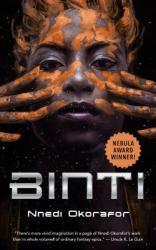
This was a fun little sci-fi novella. Binti is about a Himba girl from Earth -- the eponymous Binti -- who is accepted into a super-prestigious university and becomes the first Himba to go off-planet to attend college. There's a lot of prejudice against Himba by the Khoush on Earth, so Binti is nervous about traveling outside of her homeland, but when she gets on a shuttle with fellow students they find they have their love of science and astronomy in common, and she begins to feel optimistic about attending Oomza University. However, part-way into the journey the Meduse, a type of alien in a long war against the Khoush, attack the ship at dinnertime and kill all the students -- except for Binti. She’s not exactly sure why, but it seems to have something to do with a mysterious artifact she found in the desert that she keeps as a good-luck charm. Binti hides in her room, but she fears it will only be a matter of time until the Meduse kill her; she might not be Khoush, but she's a human on a Khoush ship, and that's enough. What seemed like the beginning of an exciting new life now is going to end just days after her departure.
I listened to Binti as an audiobook, and the narrator did a wonderful job with the story. I enjoyed Binti’s perspective and was drawn in by the back-story of their world -- the astrolabe technology everyone seems to use, Binti’s skill as a Harmonizer, living space-ships, and many other intriguing details. It’s extremely short -- just 90 pages -- and at the end I definitely wanted more information about the world and its people and technology. On the one hand, it’s good that Okorafor made me care enough to be interested in hearing more, but the tradeoff was that book felt a bit rushed/cramped at times. There are novellas that work perfectly in that form and are paced so well that they’re as rich and complete as a full-length novels, but this one didn’t quite meet those standards. This is intended to be the first book in a series, so I'm cutting it some slack for that reason, but it still didn't quite work on its own. The message was strong, but there were plot points I would have loved to see explored in more depth, relationships I wish had been better fleshed out, and some finer details of the setting that I wish Okorafor could have delved into to make for a more satisfactory ending. I still enjoyed the story for what it was, and I'll be looking out for the next entry in the series, but it fell a bit short of what I wanted. That being said, it's a creative story with a very cool setting, and I would certainly recommend Binti to fellow sci-fi fans.
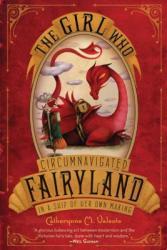
I've yet to read something by Catherynne M. Valente that isn't absolutely gorgeous -- admittedly I may be a little bit biased, as I definitely think folkloric stories are the best, and folkloric stories with lovely playful twists are the BEST best... But when it comes to evocative and clever prose, as far as I'm concerned Valente is on a level all her own. At the moment, I happen to be reading her "Fairyland" series, and so... Behold, the first book -- "The Girl who Circumnavigated Fairyland in a Ship of her Own Making!" It's just as whimsical as it sounds.
So there's this little girl named September, living in a lonely house and washing a bunch of lonely teacups all the time and feeling very trapped. A quirky and talkative Green Wind -- apparently a defiant and spirited sort of wind -- riding a leopard shows up to spirit her away to Fairyland if she likes. This book is very much like "Alice's Adventures in Wonderland" for the modern age: September has loads more authority over herself and her destiny, for one, and she grows dramatically as a human being over the course of the series. Fairyland helps that along of course, despite being a wild and alien place, complete with folkloric and/or mythological figures both eternal and re-imagined, petulant tyrants with very impressive hats, and interesting twists and turns aplenty that I can say I definitely didn't see coming. Valente's world is simultaneously familiar and wonderfully fresh, like she's composed words to go along to the tune of a well-beloved song, shifting its meaning in unexpected ways while still keeping true to the soul of something timeless.
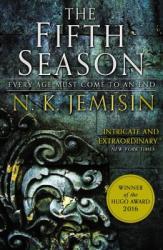
I loved this book. I've been looking for a new fantasy series for a long time now, but I haven't come across anything recently that's caught my eye. I almost gave up on The Fifth Season too, in part because the narration is in second person, which I found jarring at first, and in part because Jemisin drops you in the middle of the action with little explanation and no hand-holding. It took me a few chapters to get into the story and figure out what was going on, but I'm glad I stuck it out because the plot and characters ended up being great. Despite what I just said, I think it's almost better to go into this blind, but I'll try to describe it without giving too much away.
The continent our characters live on, "The Stillness," is a post-apocalyptic hellscape. There is near-constant seismic activity that triggers a new catastrophe (called a "Fifth Season") every few centuries -- sometimes in the form of massive crop-failures, sometimes in the form of volcanic eruptions, sometimes massive earthquakes that destroy whole regions (she includes a helpful appendix of these disasters if you're curious). In this world, there is a group of people known as orogenes (or more derogatorily as "roggas") who have some degree of control over seismic activity -- they can "sess" earthquakes, and, with training, prevent them from being too destructive. But they're also powerful, extremely dangerous, and widely despised -- many people kill their own children when they discover what they are, and it's often a race against time to see if a Guardian (their mysterious and sinister keepers) can arrive to collect the child before the family or the community has killed them. The plot isn't chronological; it moves around from chapter to chapter in order to tell three stories at three points in time: 20-odd years ago, when a young girl is taken to the capital to be trained as an orogene; some 10 years after that when a mid-level orogene goes off on a mission with her senior to investigate a disturbance in a coastal community; and "now," in the immediate aftermath of the latest apocalypse, when we follow a woman who is struggling to cope with her son's murder just as the quake hits.
I'm not going to say that it's an entirely original idea, but I think the execution was solid and I loved the dialogue and cast of characters. There's no lack of action, but Jemisin also takes the time to dig into her characters' emotional lives, and after a while the use of "you" starts to fade into the background. There's a strong focus on discrimination, both in terms of how orogenes are viewed in society and in terms of the treatment of subordinate nations and peoples by the Sanzed Empire that has conquered the continent. A lot of fantasy is set in pseudo-Europe (and often just pseudo-England), so it was refreshing to read something more diverse, and there's a wide variety of representation in terms of race, gender, and sexuality throughout. I would give this 4.5/5 stars if that were possible, but since it isn't I've left it at 4. It wasn't perfect, but it was a very strong start to the series, and I look forward to starting the second book, The Obelisk Gate, which just released this September. I would definitely recommend this to fans of fantasy.
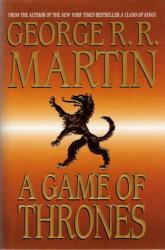
I'm not a fantasy reader. I'm not even a fantasy watcher, but like so many other readers of Game of Thrones, the sheer awesomeness that is the series led me to read the book. This book VERY GOOD! This is high praise coming from a non-fantasy reader. I actually was glad I had seen the series because it helped me better visualize everything. I'm not going to continue on with the series because the books are really very long and I just can't commit to that. But I'll keep watching and loving the series! 4 stars because the book was too long and dragged in some places.